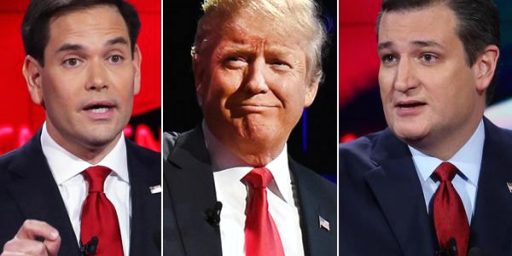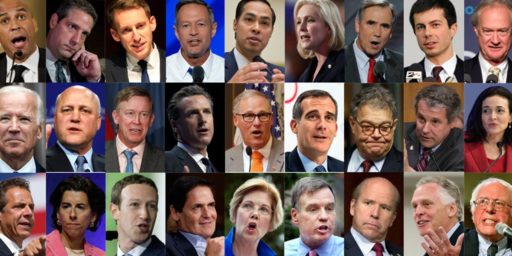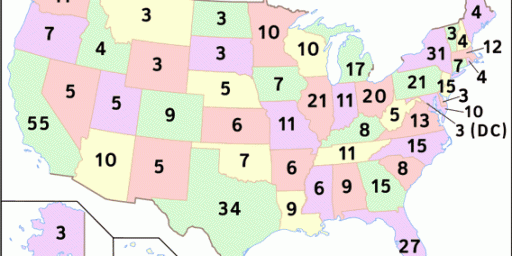Iowa was a Waste?
Who knew?

Reid J. Epstein has an essay at the NYT entitled Iowa Was Meaningless. It beings thusly:
All that time in Iowa turned out to be a waste.
He further notes:
We spent countless hours reporting about how Iowa’s Democratic electorate longed for a younger, fresh-face candidate who could usher in generational change. We found out which campaigns had the strongest ground game. We walked readers through the state’s byzantine caucus process. Our colleagues chronicled local supporters’ lament that there was “no excitement” around Joe Biden’s campaign.
All of those things were important because of the belief that a winning performance in Iowa can catapult an underdog candidate to the White House. But that has happened only twice — for Jimmy Carter in 1976 and Barack Obama in 2008. Iowa’s power now lies in its nostalgia, while the Democratic electorate has become far more diverse than the caucusgoers candidates encounter in Iowa.
In the end, the race in Iowa this year was a contest to see who could become president of Iowa. Pete Buttigieg narrowly won, but we didn’t find out the results until after the epic fiasco that was the caucus counting process.
I will be honest, it is unclear to me how self-aware this essay is, as all his observations are, in my opinion, both self-evident and hardly new. Iowa gets attention for one reason, and one reason only: it goes first. That status leads, therefore, to both candidate visits and media coverage. And then the media coverage and the candidate visits become a perpetual motion machine.
And while the Iowa vote count debacle was, in fact, a debacle, the main reason it was such a huge deal was that TV news organizations had worked to turn it all into a show rather than a news event. When the star of the show (vote totals) is too drunk to come on stage for the Big Event, people get upset that the show they came to see didn’t happen as planned. (Nobody cares the hung-over star eventually shows up days later).
Do I think we will learn our lesson? I suspect not. Anyone with any kind of understanding of this process knows that starting with Iowa is a mistake. Likewise, they know that caucuses are a bad process. Nonetheless, the show must go on, it seems.
I have repeatedly discussed the flaws in the US nomination system, and will not repeat those critiques here. Instead, I will note another point I have made, although perhaps in a slightly different way. A key purpose of the primary process is to construct a cross-state coalition of Democratic voters to support the party’s nominee. Since a main component of the Democratic coalition is the African-American vote we are long past the time that the nomination process takes this into account. Starting in lily-white Iowa and following up with lily-white New Hampshire is, quite frankly, foolish. And having Nevada go third, another caucus state with its own idiosyncrasies isn’t all that smart, either.
If the party is going to stick with a state-by-state delegate selection process, it simply has to rethink how it does it.






Pre COVID-19 one of my hopes is that the post-mortem for this election cycle would be a rethink of the primary process. Now I’m not as sure that can effectively happen.
However, I do think there is some value in an early (more Representative) state-by-state approach followed by multi-state super primaries. My feeling is that the party benefits from a structure that allows less initially well funded campaigns to be able to be competitive but then quickly moves to a rapid widowing out process.
Of course, I’m not a political scientist, so there are probably a lot of counterfactuals I’m not considering in that approach.
I’m reminded of a “news magazine” story I heard on NPR about the history of Dixville Notch in New Hampshire.
Basically it’s a town that doesn’t really exist and pretty much none of the people who vote there actually live there, and the State of New Hampshire and the national news media have all been deliberately ignoring the fact it’s a giant fraud for decades because it makes organizing press coverage of the election more convenient.
The problem begins even before the press gets interested in the horse race. I suspect there are already potential candidates for 2024, as it will likely be an open seat, reaching out to political insiders in NH and Iowa introducing themselves and trying to judge interest. If not for C-19, they would likely be making visits.
Somehow we need to get to a selection system that doesn’t begin, more than a year before the election.
I have a friend from Iowa who has been active in the caucuses. He says that the news media completely misunderstands the point of the exercise: it’s to give candidates a chance to prove that they know how to put together a professional campaign team. Anyone who gets more than (roughly) 10% has passed the test, and exactly where they finish is completely irrelevant going forward.
If the news media covered it that way, it would have some value.
@Kari Q: To be honest, I think that is a self-serving rationalization for Iowa. The reality is that any place the process started would inherently have the same test built into it.
@Steven L. Taylor:
Agreed. There’s no particular reason why Iowa should be first and any other state or rotation of states would be fine. My comment was intended simply as criticism of the way the caucuses are played in the media.
Iowa, or whatever state replaces it, serves one purpose.
Culling the weak.
Epstein was shockingly naive in expressing his grievance as new, or particularly insightful. This is known.
You put a dozen or so candidates and hundreds of political reporters into a Petri dish for a year. It’s going to get weird and a lot of reporters will file shotty stories.
Any state that goes first will get that full press treatment.
It isn’t Iowa (well, to some extent yes because of the caucuses), but literally any other state which went first would have been equally culpable fodder for Epstein’s piece.
Iowa and New Hampshire cull the weak. It is their purpose.
Anyone who tells you winning Iowa implies this is undeniable momentum is shining you on.
Forcing candidates to engage in retail politics early on can be very revealing.
—
Iowa, New Hampshire, South Carolina, and Nevada all have a different focus and message.
One state has to go first. The candidates and the reporters would demand it. They get to strut and parry.
@de stijl:
I have my doubts that the skills needed for retail politics are the same skills needed to be the chief executive of a superpower.
Accepting the premise for the sake of argument, it ought to be a primary state, not a caucus state. And it ought to be one that is more representative of the party’s base coalition.
You do accept the premise that one state goes first?!
What should happen thereafter?
How does it play out?.
@de stijl:
Actually, no. I would prefer a multi-state situation as first if we are going to do this primary thing.
I was just accepting the premise as presented.
I would prefer a multi-state pour out, but Iowa culls.
New Hampshire culls.
Idiot analysts over- prefer IA and NH winners as presumptive eventual winners.
How is your preferred outcome better?
Exhibiting behavior where people agree agreebly.
Something has to go first else hundreds of reporters are filing shit stories from the “heartland” cynically for about two years.
If you propose a multistate first go, it will be as wildly over-reported and shoddily reported as is Iowa now. Instead of just that state, it will be some other states over-reported and over-weighted.
American journalism fails most during the run – up. Assigns too much meaning to ephemera and to the first.
State’s choose the rules.
Whoever goes first will be over reported and over analyzed.
A week after, it will be moot.
The first culls the weak. That is the purpose.
@Steven L. Taylor:
Thanks so so much for addressing my like quartenary concern as if it were the primary. Awesome response.
It makes me feel you have my best interest at heart, rather than trying to score a cheap score point at my expense.
P.S. you do that often
Why not California first? It’s diverse along many dimensions, ethnically, politically (counter to the stereotype of California as a blue state through and through, modern “conservatism” started in Orange County, there are lots of very conservative voters and counties), and occupationally (from high tech professionals to a huge farming region). Plus, you know, biggest state.